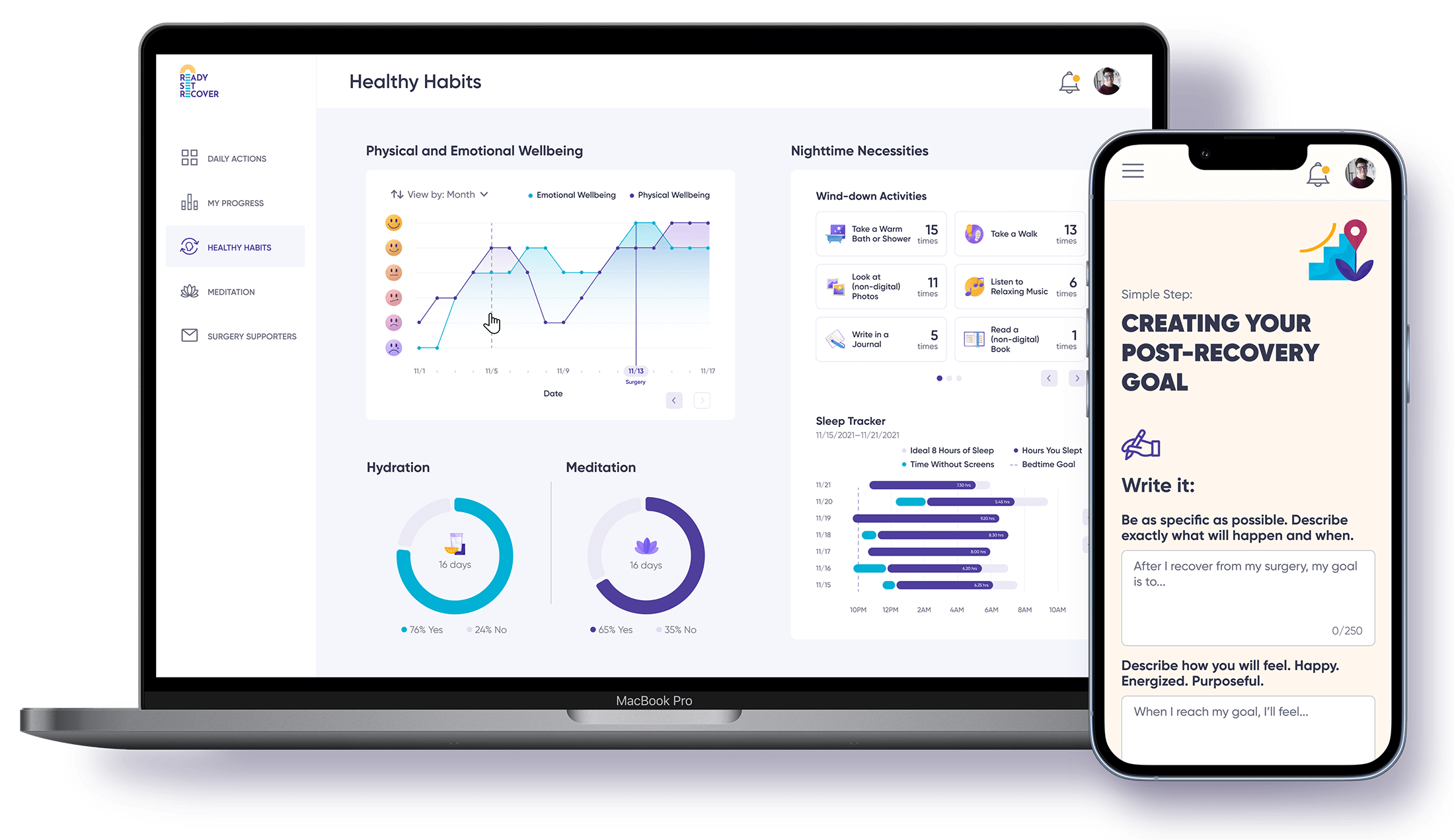Overcoming Anxiety About Surgery: A Simple Guide


Going “under the knife” can be an incredibly stressful experience. Whether it’s a minor procedure or a life-changing operation, “nerves” before surgery are common and perfectly normal. There are numerous strategies and techniques to help you stay calm and composed before surgery. In this comprehensive guide, we’ll explore a plan to manage pre-surgery anxiety, making your journey to the operating room as smooth and worry-free as possible. That said, if you suffer from severe anxiety, it's recommended you seek treatment with a professional before surgery to ensure it does not interfere with your ability to cope and to minimize health risks.
Key Takeaways
Recognize that pre-surgery anxiety is common, but strategies to reduce stress are available and frequently successful.
Utilize relaxation techniques such as breathing exercises and visualization, seek support from family/friends, create a pre-operative ritual and consider medical interventions.
After surgery: be mindful of physical & mental health, rest & exercise regularly, eat well and stay hydrated for a smoother recovery process.
Why Anxiety About Surgery Feels So Intense (And How to Manage It)

It’s normal to feel anxiety about surgery. The thought of pain, anesthesia, or complications can feel like a lot to process. Uncertainty makes the mind race, turning small concerns into big fears. But you don’t have to stay stuck in worry. The more you understand about the surgery, the less power fear has over you.
Common concerns include:
Potential pain following the surgery
Possible surgical complications
Long recovery time
Anxiety can manifest in mild, moderate, or severe levels, with severe anxiety having its own set of anxiety symptoms, and finding ways to calm anxiety is essential for overall well-being.
Grasping the influence of anxiety, particularly negative feelings, serves as a helpful initial step towards mitigating pre-surgery anxiety. Hospitals sometimes provide special support, such as support groups, to help patients cope with their surgery anxiety. By recognizing that pre-surgery anxiety is a common experience, you can begin to develop strategies to relieve this stress and set your mind at ease.
The Psychological Impact of Preoperative Anxiety
Surgery anxiety can have a significant impact on both mental and physical health. It can lead to:
Depression
Post-traumatic stress disorder
Delayed wound healing
Increased hospital stay duration
Reduced satisfaction
Increased recovery time
Impacts on a person’s quality of life
Preoperative anxiety can also cause physical symptoms such as increased heart rate and blood pressure.
Different patients fear different aspects of surgery, and understanding these fears can help in addressing and relieving them.
It is beneficial to manage surgical anxiety as it contributes to both mental and physical well-being and helps in soothing the nerves. Being aware of the potential effects of preoperative anxiety and taking steps to address it can lead to a smoother surgical experience and a faster recovery.
Tackling Anxiety Through Knowledge
Gaining knowledge about upcoming surgical procedures can assist in alleviating pre-surgery anxiety. Consulting with medical professionals, such as surgeons and anesthesiologists, can ease worries and provide tailored information regarding the surgical procedure. Knowledge is power, and understanding the ins and outs of your surgery can help you feel more prepared and less anxious.
Some strategies to help reduce pre-surgery anxiety include:
Gaining information in advance
Discussing worries with others
Reading for distraction
Practicing relaxation techniques such as deep breathing
Arming yourself with information and confronting your anxiety directly can change your fear of the unknown into a feeling of control regarding your impending surgery.
Some patients also explore AI for medical advice as a first step in clarifying what to expect and what to ask their doctor — which can reduce uncertainty and ease anxiety before surgery.
Relaxation Techniques to Relieve Anxiety

Relaxation techniques can be a powerful tool in easing surgical nerves and reducing pre-surgery anxiety. Breathing exercises, meditation, or muscle relaxation are just a few methods to consider. These techniques can help turn severe anxiety into a more manageable state.
The subsequent subsections will provide a comprehensive view of two primary relaxation techniques: breathing exercises and visualization techniques.
Breathing Exercises

Breathing exercises offer numerous benefits in calming nerves before surgery. They can help promote:
Relaxation
Reduced anxiety
Increased oxygen exchange
Lowered blood pressure
Slowed heart rate
Moreover, practicing breathing exercises can improve mental health, reduce stress, and even induce positive emotions.
It is suggested to practice breathing exercises regularly, such as daily or as needed, to promote relaxation and relieve anxiety. Studies have shown the effectiveness of yoga-based breathing exercises in reducing anxiety in patients scheduled for cardiac surgery. Incorporating breathing exercises into your pre-surgery routine can foster a sense of tranquility and prime you for the operation.
Visualization Techniques
Visualization techniques are mental exercises that involve creating a mental image of your desired outcome. These techniques can help manage pre-surgery anxiety by focusing on the desired outcome and creating a positive outlook. Visualization exercises, such as guided imagery or healing visualization, can be practiced once or twice a day starting a few days before surgery.
Research suggests that visualization techniques can reduce preoperative anxiety and blood cortisol levels. Envisioning a successful recovery and positive surgical experience can mentally prepare you for the procedure and foster a feeling of tranquility and control.
The Role of Support Systems in Easing Anxiety

A strong support system is invaluable in managing pre-surgery anxiety. Here are some ways a support system can provide assistance:
Emotional comfort
Helpful assistance
Useful information
Distraction and relaxation
Increased assurance
Family members and friends can play a significant role in offering a supportive environment, recommending relaxation techniques, playing soothing music, assisting in gathering information, and spending quality time together.
Emotional support is particularly important for those preparing for surgery, as it can help reduce feelings of anxiety and stress that can have a negative effect on recovery and post-operative symptoms. Surrounding yourself with loved ones and seeking professional support when needed can make a significant difference in your pre-surgery experience.
Medical Interventions for Managing Anxiety
Medical interventions, such as benzodiazepines, melatonin, or sedatives, may be prescribed to help manage pre-surgery anxiety. Pain medication, like sedatives, is typically administered through an intravenous line (IV) or a shot into a muscle, helping you feel more relaxed and drowsy before the procedure.
Always inform your doctor if you have already taken a sedative before coming to the hospital. They can provide personalized advice and recommendations to ensure the best possible outcome for your surgery and recovery.
Staying Engaged and Distracted
Engaging in activities and distractions can be an effective way to keep your mind occupied and reduce anxiety before surgery. Some helpful techniques to reduce anxiety before surgery include:
Cognitive-behavioral therapy
Music therapy
Pre-op preparation videos
Aromatherapy
Hypnosis
Guided imagery relaxation
Activities like reading a book or watching a DVD
Research has shown that distractions such as music or animation can help ease preoperative anxiety in children undergoing surgery. Engaging in pleasant and captivating activities can foster a feeling of calm and diminish anxiety in the lead-up to your operation.
Professional Support Options
Various professional support options are available to help ease pre-surgery anxiety, such as:
Counseling
Therapy
Music therapy
Relaxation techniques
Cognitive-behavioral therapy
Anesthesiologist support
In addition to these options, other medical professionals may also provide valuable assistance in managing surgery anxiety.
The role of a counselor in managing pre-surgery anxiety is to provide psychological support and preparation for the patient, helping to alleviate fears and doubts.
Psychologists and therapists with expertise in anxiety disorders can provide support and treatment for individuals feeling anxious about surgery. Seeking professional assistance can better prepare you to handle the emotional challenges that come with surgery.
Other Support Options
As you can see, there are a variety of methods to calm nerves prior to surgery, but being aware of these options and putting them into use requires taking action. Ready Set Recover has been developed to provide these tools within a structured wellness platform. Ready Set Recover creates a framework to follow and build healthy habits to ensure a correct course at a very critical time. Furthermore, it is physician vetted and backed by science and is designed to optimize results. Plus, it's 100% guaranteed.
Lifestyle Adjustments for Better Coping
Making lifestyle adjustments, such as practicing self-care and reducing stress, can help you better cope with surgery anxiety. Regular exercise before surgery can help reduce the surgical stress response, enhance preparedness for the surgery, lower anxiety and distress, and even minimize complications. A balanced diet can also support mental health before surgery by providing essential nutrients that promote brain health and regulate mood.
Incorporating regular exercise, a balanced diet, and self-care practices into your daily routine can lay a solid foundation for managing pre-surgery anxiety and promoting a smooth recovery.
Post-Surgery Considerations
Reflecting on post-surgery care and recovery is beneficial for ensuring a comfortable transition and reducing anxiety following the procedure. Common post-surgery recovery techniques include:
Resting and moving without overdoing it
Eating a nutrient-dense diet
Staying hydrated
Following your surgeon’s instructions and taking medications as prescribed
It’s also important to be mindful of mental health after surgery, as it’s not uncommon to experience depression, anxiety, and PTSD symptoms during the recovery process. Focusing on both physical and mental well-being during your post-surgery recovery can set the stage for a smoother and more comfortable healing journey.
Anxiety About Surgery Doesn’t Have to Hold You Back
In conclusion, managing anxiety before surgery is a multifaceted process that involves understanding the reasons behind pre-surgery nerves, the psychological impact of surgery anxiety, and the importance of knowledge and support systems. By employing relaxation techniques, creating a pre-operative ritual, seeking professional support, and making lifestyle adjustments, you can better equip yourself to handle the stress and anxiety that often accompany surgery. Remember, you are not alone in this journey, and with the right tools and support, you can face surgery with confidence and resilience.
Related Articles:
Frequently Asked Questions
How can I calm my nerves before surgery?
Calming your nerves before surgery can be achieved by listening to music you enjoy, getting information ahead of time, and engaging in relaxation activities like reading and deep breathing.
What do they give you to calm you down before surgery?
To help you relax before surgery, an anesthesiologist may administer a medication such as midazolam (brand name: Versed) to reduce anxiety and memory of the procedure.
What to say to someone who is anxious about surgery?
Reassure them that they are in good hands and that feeling nervous is normal. Encourage them to focus on the benefits of the surgery, remind them to take things one step at a time, and offer to support them before and after the procedure.
Can anesthesia make anxiety worse?
Yes, general anesthesia can worsen preoperative anxiety, as it requires a higher dosage of sedatives to achieve an acceptable level of sedation. Additionally, the lack of control experienced by patients during surgery can lead to heightened anxiety levels. So it is important to talk to your healthcare provider and manage your anxiety prior to anesthesia.
What are some common reasons for surgery anxiety?
Surgery anxiety is a common fear stemming from concerns about the anesthesia, post-surgery pain, potential complications, and lengthy recovery process.
How can I practice relaxation techniques to reduce pre-surgery anxiety?
Try taking deep breaths, meditating, or practicing muscle relaxation to help reduce pre-surgery anxiety. These relaxation techniques can be calming and provide peace of mind before surgery.







